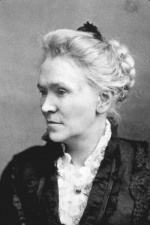Matilda Joslyn Gage: Difference between revisions
Pablo Sender (talk | contribs) No edit summary |
Pablo Sender (talk | contribs) No edit summary |
||
| Line 3: | Line 3: | ||
<br> | <br> | ||
<br> | <br> | ||
[[File:Matilda Joslyn Gage.jpeg|right|150px]] | |||
'''Matilda Electa Joslyn Gage''' ([[March 24]], 1826 – [[March 18]], 1898) was a suffragist, a [[Theosophist]], a Native American activist, an abolitionist, a freethinker, and a prolific author. | '''Matilda Electa Joslyn Gage''' ([[March 24]], 1826 – [[March 18]], 1898) was a suffragist, a [[Theosophist]], a Native American activist, an abolitionist, a freethinker, and a prolific author. | ||
Revision as of 21:20, 2 January 2014

Matilda Electa Joslyn Gage (March 24, 1826 – March 18, 1898) was a suffragist, a Theosophist, a Native American activist, an abolitionist, a freethinker, and a prolific author.
Biographical data
Matilda was born in Cicero, NY (near Syracuse) to Hezekiah and Helen Joslyn. Her father was a noted abolitionist who educated his daughter to be a “freethinker”. She was an active figure in the woman’s rights movement and other social causes throughout her life. She was coauthor, with Elizabeth Cady Stanton and Susan B. Anthony, of the three-volume History of Woman Suffrage, and was one of the prominent early members of the National Woman Suffrage Association (Wagner, Declaration 2, 20)
Involvement with Theosophy
Matilda Gage joined the Society when she was living in Fayetteville, New York. Her application and admission to the Rochester Theosophical Society are dated March 26, 1885. She was recommended by Josephine W. Cables and E. M. Sasseville.[1] Dr. John Algeo wrote:
She was one of the three leaders in the nineteenth-century struggle for women’s rights and especially an effort to gain the voting franchise. She was a passionately devoted Theosophist, in character not unlike H. P. Blavatsky, especially in her scorn for organized religion, although her political activism was all her own. Having rejected conventional faith and the churches that espouse it, Matilda discovered a kindred soul in H. P. Blavatsky and proceeded to share the discovery with her children and grandchildren.[2]
Gage said her association to Theosophy had been the "crown blessing" of her life and introduced her daughter Maud and his husband L. Frank Baum (the author of The Wonderful Wizard of Oz) to the Theosophical Society.
See also
Online resources
Articles
- "Our Struggle is for All Life": The Theosophist/Unitarian Feminist Pioneer Matilda Joslyn Gage Commentary by Mary Krane Derr
- Reclaiming the Spooky: Matilda Joslyn Gage and Mary Daly as Radical Pioneers of the Esoteric by Marguerite Rigoglioso*Matilda Josyln Gage - the Unlikely Inspiration for the Wizard of Oz by Evan I. Schwartz
- Dorothy Gage and Dorothy Gale by Sally Roesch Wagner
- On the 100th Anniversary of the Woman’s Suffrage March on Washington, Disney’s “Oz, the Great and Powerful” Sets the Women’s Movement back beyond a century The Extreme History Project blog
Notes
- ↑ See A Notable Theosophist: L. Frank Baum by John Algeo.
- ↑ See "Theosophical Wizard of Oz" by John Algeo at Theosophy Forward
